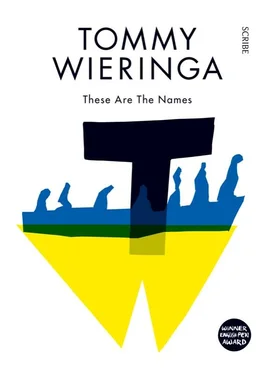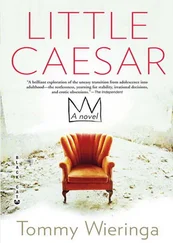Ensconced in thick pipelines, it flowed across the country’s borders. From the revenues, the sorcerer made fountains spring up from the parched earth of Kara Kum, and refashioned himself in gold in the centre of Ashkhabad. His golden statue turned to follow the sun: in the morning, it greeted the east; at night, it laid the sun to sleep again in the west. The people suffered his self-aggrandisement resignedly. They grew accustomed to the daily portions of madness. They lived like fleas, with no say in the crazy gyrations of their host.
He gave new form not only to the daily lives of his subjects, but also to their imaginings. All imaginings — national, cultural, historical, and, ultimately, personal.
One day, the man from Ashkhabad developed an itch, locally at first, on his shoulders. In the mirror he saw red circles. They spread steadily, until his upper body was covered in them. He scratched, and watched the flakes rain down slowly on the sink. He scratched without stopping. At first he held himself in check when others were around, but soon abandoned all shame and scratched in company as well. He groaned quietly as he did so. In the garage at the bus company where he worked, they joked about him. They called him ‘the last dog of Ashkhabad’ — Turkmenbashi, after all, had banished all dogs from the capital. The itching took over his life completely. Now there were two things from which he could not escape: the eyes of the father of all Turkmen that followed him everywhere, and the raging itch that covered his torso.
He scratched his skin till it bled. He rubbed himself with salve, and when that didn’t help he was given pills. The red circles withdrew, but didn’t disappear — at best, they bothered him less for a time. The cuts healed, and his skin was bedecked with pale scar tissue. But after a few weeks the circles reappeared and he was cast back into the hell of hideous itching. He let his nails grow, the better to scratch himself with.
At the hospital, the doctor gnawed on his pen; this mysterious resistance was beyond his competence. Then he remembered a patient who had been cured of something similar after taking salt baths in the bay at Kara Bogaz.
Kara Bogaz!
It was like sending someone to the ends of the earth! Kara Bogaz — a lagoon containing the most highly saline water on earth.
In commiseration, he looked at the man who sat there scratching himself and moaning quietly, and felt that he could not keep from him this unscientific bit of advice.
To the west of Ashkhabad, far away along the Caspian coast, lies the mysterious bay called Kara Bogaz, the Black Maw. A saline waterfall there funnels the waters of the Caspian into its shallow basin. Under the relentless desert sun the water in the bay evaporates almost as quickly as it can be replenished. The salt that precipitates to the bottom is called Glauber’s salt, after the German chemist who discovered its laxative properties.
This miracle salt will eat clean the skin of the man from Ashkhabad.
He receives a transit pass to Kara Bogaz. His file is marked with the comment that he has one week’s leave of absence, for ‘medical’ reasons.
The bus plods westward as the yellow heat of the Kara Kum conjures up shimmering ponds on the asphalt. The chauffeur drives with his shirt unbuttoned, and shouts to be heard above the engine’s howl. ‘Kara Bogaz? There’s nothing out there, colleague!’
The man from Ashkhabad would rather keep his thoughts empty and stare out the window at the semi-arid landscape as it glides past, but finds himself obliged to listen to stories about salt storms. It started twenty, twenty-five years ago, when the level of the Caspian suddenly dropped. The best minds in science searched for the cause, and when they found none, the bay at Kara Bogaz was singled out as the thief of the seawater that roared through that narrow channel into the gigantic basin.
The thief was punished: the bay was dammed. The evaporation basin could no longer feed itself on seawater. The hydraulic engineers’ prognoses, based on solid calculations, were that it would take about twenty years for the bay to dry up.
The bay dried up after two years.
The metres-thick layer of salt at the bottom of the bowl blew away, carried hundreds of kilometres inland by the wind. The soil became saline, as a lashing rain of salt cut a swath of destruction across the land. The powder glistened on the fields, settled on the leaves of the cotton plants, and ruined the harvests.
When the empire of the Bolsheviks fell, the dam was breached.
The water returned to its former shores.
The driver looked over at his passenger, who was scratching himself.
Still, the itch had already diminished, the man from Ashkhabad noted in surprise, as though it were keeping a low profile at the mere prospect of a concentration of salt high enough to sink ships.
The chapped earth lay motionless beneath the steely sun. The bus pulled over to the side of the road. The chauffeur walked out a ways onto the flat, planted his feet far apart, and pissed in the dust.
‘Four more hours,’ he said as he climbed back in.
The bus would go no further than the port town of Turkmenbashi, formerly known as Krasnovodsk. The next day, the man from Ashkhabad would have to find a bus or taxi willing to take him to Cape Bekdash, the smattering of houses close to Kara Bogaz. With a grunt and a groan, the driver slid his backside onto the seat of faded towels.
Further along they came to a roadblock, and a policeman entered the bus. The man from Ashkhabad handed him his pass. The driver leaned over inquisitively in his seat.
‘Kara Bogaz?’ the policeman asked.
The other man nodded.
‘Here … What does this say?’
The man from Ashkhabad looked. ‘Medical reasons,’ he said.
‘Medical reasons,’ the policeman said. His silence lasted a few moments. Then he said: ‘There’s no hospital there. Not at Kara Bogaz.’
‘It’s my skin. The salt water will heal my skin.’
The itching started again. It felt as though he were rolling through an anthill. The sensation eclipsed his thoughts. He clenched his teeth and forced his hands to stay where they were; if he started scratching now, it would look like he was attacking himself.
Every destination, every movement, became preposterous under the uniformed man’s sharp eye. Why do you have to go there? What objective could be important enough to put you on the road in this heat? Why didn’t you stay where you were? What business could you possibly have going there?
The policeman wiped the sweat from his forehead. His suspicion ebbed, making way for a lack of interest.
Twilight was settling in. Onwards, always westward, the bus went. The open windows let in whiffs of coolness. Copper mountains loomed up forlornly, one by one, from the desert floor. Purple light entered at the windows; a dull section of moon was already floating on the horizon. There, too, were the lights of the port town, sparkling in the royal-blue evening. Its presence comforted him; the traveller breathed calmly, in and out.
At the bus station, the concrete exhaled the heat of the day. Spilt oil gleamed under the neon lights, and the man from Ashkhabad left the station and walked along the dusty shoulder into town. At Pension Buchara, he checked in for the night. Arms crossed behind his head, he lay on his bed and stared at the reflections of streetlights and the play of passing cars on the ceiling. Only when the girls and their sailors stopped stumbling through the hallway did he fall asleep.
The next morning, he strolled along the quay, ate watermelon, and was in no hurry to reach Kara Bogaz. He had heard that an unwholesome, sulphurous mist hung over the lagoon, that the salt deposits glistened so brightly that they blinded you; neither man nor animal held out long there.
Читать дальше











